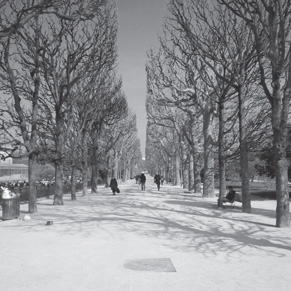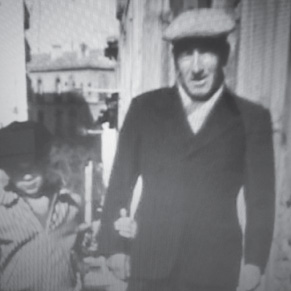

WHEN KEATS’S BROTHER TOM visited Paris in 1817, he carried a notebook in which his brother John had written down his “Sonnet to Solitude,” which begins: “O Solitude! if I must with thee dwell, / Let it not be among the jumbled heap / Of murky buildings.” But for John’s brothers, Tom and George, Paris was not a place of solitude or a heap of murky buildings. Instead, they found uncommon delicacies, gambling halls, and brothels. They ran through their money too quickly and had to return to England sooner than expected. In a letter, Keats wrote, “Like most English men they feel a mighty preference for every thing English.” Keats was then writing (“till an utter incapacity came” upon him) his long poem “Endymion,” in which the shepherd Endymion is told by his beloved, “There is not one, / No, no, not one, / But thee.”
I think Paris is the city of the beloved. Some say a man goes mad if he is without love. Je t’aime: It is said with such childlike simplicity, the subject, je, and the object, tu, making a little clump of letters to support the aime and create a memorable sound package—Je t’aime. It seems to defy the need for further explanation, despite all the French love poems:
I’d been so seized by passion for this delectable lover.
—René Char, “The Lover”
(translated by Frederick Seidel)
Kiss me, rekiss me, & kiss me again;
Give me one of your most delicious kisses. . . .
—Louise Labé, “Sonnet XVIII”
(translated by Richard Sieburth)
I have dreamed so much of you,
Walked so often, talked so often with you,
Loved your shadow so much.
—Robert Desnos, “Last Poem”
(translated by Kenneth Rexroth)
Like the meadow,
Left unattended,
Overgrown, florid
With fragrance and rye,
Amid the harsh hum
Of dirty flies.
May it come, may it come,
The time when love astounds us.
—Arthur Rimbaud, “Song of the Highest Tower”
(translated by Delmore Schwartz)
When Mother was in the hospital at the end of her life, her hands and feet were extremely swollen from the rehydration process done to excess. She was delusional and hated the hospital, where she was fed “mechanical soft” food. But my sister, Suzanne, was an excellent caregiver, rubbing lotion onto her arms and talking to her continually, which comforted her. Together we gave Mother a manicure, filing and painting her nails. “J’ai peur. Je veux ma chambre, mon lit. Ne me quitte pas. Je t’aime. Tu es mon fils. J’ai peur,” she repeated during my visits, grabbing the air. Je t’aime, Maman, I replied, feeling the inadequacy of my words. I think, in part, this is my subject as a poet—the inadequacy of language—and also my motivation. I hope my feelings are clear about this city that has been invaded, conquered, and occupied, but that still lives again. To write about Paris is not an easy endeavor, because when I write it is also a landscape self-portrait. Will I obstruct the landscape? Must I renounce myself to show the landscape without distortion? Is what I have produced a catalog of obstruction, whereby Orpheus lives not so much in self-laceration as in satisfaction? J’aime Paris.
J’aime Baudelaire, whose father died on his sixth birthday, whose stepfather sent him away on a long voyage when he was twenty, who lived for his writing and desired to derange conventions, who was the first poet to write melancholic conversational poems about the demons and perversions of his life, and yet whose art shines with an organic perfection of form.
J’aime Rilke, though he found Paris oppressive. His poems speak in a low, calm voice. He says in his Book of Hours, “Let everything happen to you: beauty and terror. / Just keep going. No feeling is final.”
J’aime James Lord, whom I last saw at the Hôtel de Crillon, redone “into a whorehouse,” he complained, with corridors of shiny marble and gold, and with Rolls-Royces and Jaguars with big hood ornaments waiting out front; still, his friendship—like soup, meat, and wine—nurtured “the poet of iron.” “Goodbye, sweetie,” he said, his gift of friendship not accompanied by any claim.
J’aime the poet and translator Claire Malroux, an alchemist of language, whose translations transport, transfer, and transpose poetry from English into French, and find a balance between passion and reason, empathy and analysis, blur and precision.
J’aime the kisses the Parisians give one another, touching their cheeks, and allowing men to do the same, though they never lock their arms in embrace.
J’aime the dogs and cats of the neighborhood, as numerous as the children. Writing this now, I can hear a litter weeping for a bowl of milk.
J’aime the silver splashing Seine River, shimmering against its banks in sunlight, and at night with streetlamps that sparkle like diamonds on the murky water’s surface.
J’aime Parisians’ strange obsession with their livers, drinking no cold beverages with ice and keeping windows closed tight to avoid les courants d’air.
J’aime the expressions Je vais lécher les vitrines, meaning literally to lick the windows while window-shopping, and Elle est à-côté de ses pompes, meaning that she is next to her pumps when she is not feeling quite like herself.
J’aime the sympathetic oysters, sea urchins, and crustaceans displayed on platters of ice outdoors on the avenues, like vulnerable, paralyzed, edible artworks.
J’aime the BBC affects that Parisians deploy when speaking English with heavy accents: I shall see you in a fortnight at Fontainebleau.
J’aime the Église de la Madeleine, because of Mary Magdalene, whose boat, without sails, is said to have landed, like a migrant’s, at the mouth of the Rhône before she took refuge in a mountain-forest cave.
J’aime the kirs with Octave (black-currant liqueur topped off with white burgundy) at the Café Rostand, in winter sunlight, overlooking the Luxembourg Gardens.
J’aime Aunt Julie, who lived through the Nazi occupation of Paris as a Jew, and who never fully recovered from a broken heart after her brother died. We drank chicory together and she was kind to me.
J’aime the little wooden matchsticks (allumettes!) with rose-colored combustive tips, which I light the gas stove with to make café au lait in the morning.
J’aime the long colonnades of gnarled trees at the Jardin des Plantes, with their big scarred trunks, and the red poppies scattered everywhere with bumblebees hugging their stamens.
J’aime the handwritten brasserie menus, the cursive writing less rigid and boxlike than print, with a feminine flourish, like a Peugeot.
J’aime the electrician who speaks with a heavy Marseille accent, like Uncle Gabriel, and who believes that Americans put ketchup on everything.
J’aime the myriad shades of blue in the flower shops, of gray in the sulking sky, and of the primary colors in the ubiquitous posies in the squares.
J’aime the sweet cherries, Cavaillon melons, morel mushrooms, and white asparagus at the marché.
J’aime the fountains that make only a little sound when you walk by.
J’aime how things change only slowly, despite the endless groan of construction and refurbishing.
J’aime the peace, beauty, and sense of calm that allow me to contemplate the lives of my maternal ancestors.
J’aime the Buddhist monks and the Mormon missionaries, Aaron and Judd, who hoped to convert me and, with their deep blue eyes, almost did when we prayed on our knees together.
J’aime Gabriel, Michel, and Raphael, the lifeguards at the municipal pool, who tried to revive the swimmer who suffered a heart attack. Were they the archangels? I dove to the bottom and retrieved his goggles drifting there.
J’aime the railway cars spewing marvelous wisps of steam at the Saint-Lazare station in the impressionist paintings at the Musée d’Orsay, where color and light achieve an abstract vision.
J’aime the decrepit elderly who inch down the avenues with two canes to prop them up, who impose on nobody and nothing but Time.
J’aime La Closerie des Lilas, where poets once met regularly. Eating poached haddock with spinach, I translated a quatrain that Octavio Paz wrote there: “To the most romantic corner in Paris / where I left my heart and my illusion. / Between the glasses of red wine and quail breast / I leave this epigram full of affection.”
J’aime the red-clay tennis courts at Roland-Garros, where I watched my favorite player, powerful and restrained, past his prime yet elegant, like a god in his twilight.
J’aime the Napoleonic Civil Code, Title V, Chapter 6, on “marriage and the respective rights and duties of married persons,” updated to include gays and lesbians.
And j’aime Octave, searching, affectionate, funny, still finding his place.
For a time, I lived here, where the call of life is so strong. My soul was colored by it. Instead of worshiping a creator or man, I cared fully for myself, and felt no guilt and confessed nothing, and in this place I wrote, I was nourished, and I grew.
